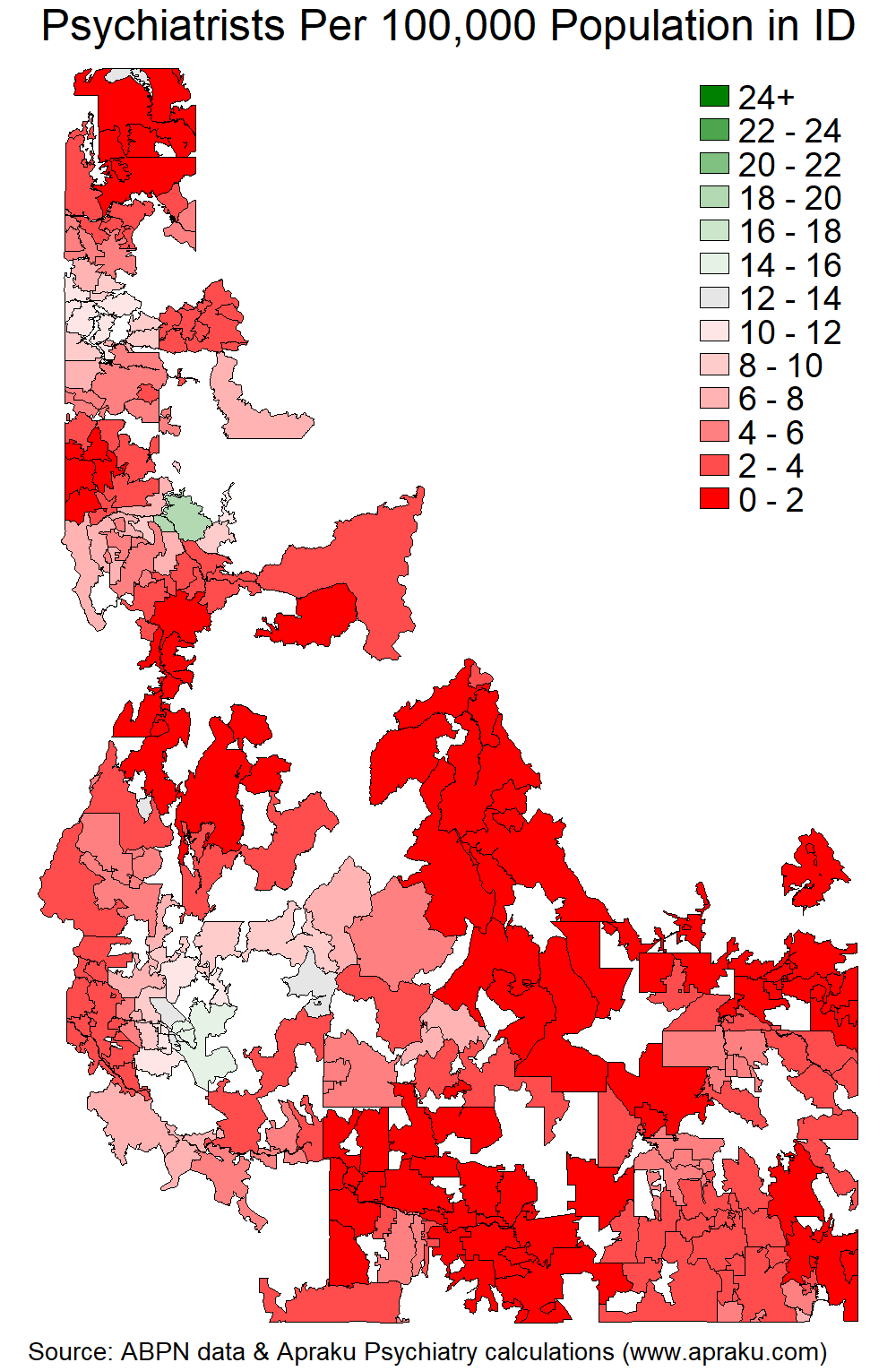|
Idaho's psychiatrist shortage is triggering a mental health crisis throughout the state, especially in rural areas where patients lack access to in-person psychiatric services. This blog post explores the factors driving the crisis and evaluates its damaging effects. We highlight the critical role of telemedicine in broadening access to high-quality specialist mental health care. Discover how you can navigate Idaho's psychiatrist shortage with telemedicine services such as those offered at Apraku Psychiatry.
Key Insights on Idaho's Psychiatrist Crisis
Overview of Idaho's Psychiatrist ShortageThe shortage of psychiatrists in Idaho is a critical issue that is affecting the mental health of the state's residents, especially in rural areas. The shortage has significant negative consequences for individuals, families, and communities, and addressing it is crucial for improving mental health outcomes in the state. Let’s start by taking a deeper dive into the numbers. With a population of nearly 2 million people, Idaho has fewer than 100 Board-certified psychiatrists, which translates to just 5 psychiatrists per 100,000 people. This is less than half the national average of 11 psychiatrists per 100,000 people and barely a third of what is considered adequate by the Department of Health and Human Services to meet the mental health needs of the population. The dearth of psychiatrists is especially acute in rural areas, where many residents are unable to access the mental health care they need. According to data from the American Board of Psychiatry & Neurology, most of Idaho's 44 counties have no psychiatrists at all. Unfortunately, the concentration of psychiatrists in Ada County, where more than half of Idaho's psychiatrists are located, only exacerbates the issue of limited access to mental health care for those outside the county. The Causes of Idaho's Psychiatrist ShortageThe shortage of psychiatrists in Idaho has been caused by three key factors, which have contributed to a lack of access to mental health care for residents in the state:
Effects of Idaho's Psychiatrist ShortageThe shortage of psychiatrists in Idaho has far-reaching consequences that affect individuals and communities. Patients seeking mental health care often face obstacles such as long wait times and limited transportation access, particularly in rural areas, which can lead to untreated mental health disorders. The situation is further complicated by Idaho's high suicide rate, one of the highest in the country. Without proper care, mental health disorders such as depression or bipolar disorder can worsen and lead to suicidal thoughts or attempts. Many individuals may not receive the necessary treatment or medication, leaving them vulnerable to further mental health decline. Additionally, some may resort to self-medication, resulting in substance abuse that only exacerbates mental health problems. In the absence of sufficient psychiatrists, many Idahoans turn to other providers, such as primary care physicians and nurse practitioners. While these providers play a vital role in the mental health care ecosystem, they lack the specialist training of psychiatrists. Primary care physicians may also have limited resources and support to treat complex mental health disorders, leading to delays in care and poor outcomes. The shortage of psychiatrists in Idaho has broader implications for communities, as untreated mental health disorders can lead to difficulties in daily activities such as employment, caring for loved ones, and basic self-care tasks. This can make it more challenging for individuals to access the resources necessary for recovery. The shortage of psychiatrists in Idaho therefore has significant negative consequences, highlighting the urgent need for solutions. Potential Solutions to Idaho's Psychiatrist ShortageTo effectively address the shortage of psychiatrists in Idaho, there are two main solutions.
Overall, both expanding the availability of psychiatric training programs and exploring telemedicine options can help to address the shortage of psychiatrists in Idaho. Telemedicine, in particular, offers an effective way to address access-to-care issues, especially in rural areas, and helps ensure that patients receive the mental health services they need, when they need them, regardless of their location in the state. ConclusionIdaho's psychiatrist shortage is a pressing issue that has far-reaching consequences for individuals, families, and communities. Expanding psychiatric training programs and leveraging telemedicine options are two vital solutions that can help alleviate this shortage. While both solutions have merit, telemedicine holds the most promise in the short term for addressing the shortage, as it can provide immediate access to psychiatric care for patients in Idaho, regardless of their location. Idahoans who experience difficulties accessing psychiatric care can consider making use of tele-psychiatry options, such as the Board-certified psychiatrists at Apraku Psychiatry. With appointments for new patients generally available within about a week, tele-psychiatry can be a game-changer for those in need of mental health care, bridging the gap caused by the shortage of psychiatrists in the state. This blog post is brought to you by Apraku Psychiatry. Apraku Psychiatry is a private practice offering video appointments with Board-certified psychiatrists licensed in multiple states. More blog articles can be found here. To schedule an appointment with one of our psychiatrists, patients can complete the online booking form. Comments are closed.
|
Copyright © Apraku Psychiatry 2024



